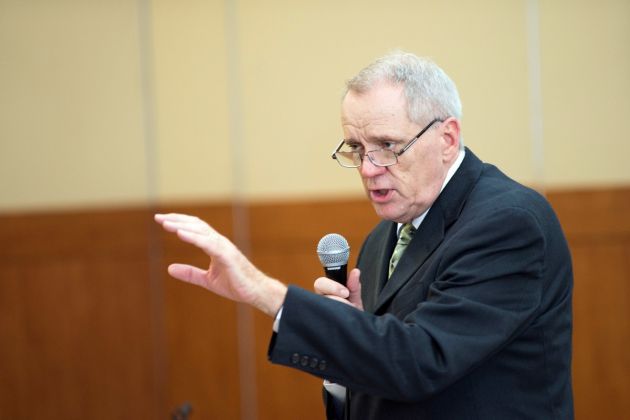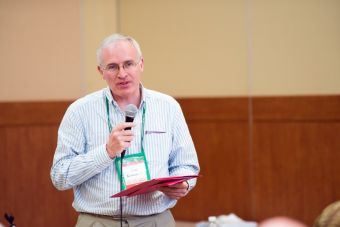Shift of center of Christian gravity to Global South 'most dramatic in history'

BUSAN, South Korea - The shift of Christianity's center of gravity away from Europe especially into the Global South over the last 100 years is the most dramatic since the Christian story began 2,000 years ago say Christian scholars.
"This 100 year shift between1910 to 2010 of the centre of gravity is the most dramatic in all of Christian history," says Kenneth Ross, co-author of The Atlas of Global Christianity.
Ross was speaking at a seminar Monday organized by Global Christian Forum at the 10th assembly of the World Council of Churches running from October 30 to November 8.
"While Europe's share of the world's Christians has fallen dramatically from 66 percent in 1910 [the time of the first ecumenical conference on missionaries' activities in Edinburgh, Scotland] to just over 25 percent in 2010, Africa's share has rocketed from a mere two percent to 21.6 percent during that period of time," he said.
The new trend actually reverses and earlier demographic situation in the history of Christianity globally.
"Christians of the Global South were in the majority for the first 900 years of Christian history.
"The European domination of global Christianity which we noted in 1910 is, in fact, a recent phase of world Christianity which now seems to have passed.
"Since 1981, Southern Christians are once again in the majority. The Christian faith is on the march in the Global South," said Ross.
He told an enthusiastic audience that the most dramatic occurrence that had taken place since the first great missionary conference in Scotland was the way Africa has changed.
"Less than 10 percent were Christians in 1910 but that's nearly 50 percent today. In sub-Sahara Africa that's well over 70 percent. In absolute terms the number of Christians in Africa has risen from 12 million in 1910 to almost 500 million today.
"There are now parts of Asia with a significant Christian presence and that was absent in 1910. A hundred years ago there were 25 million Christians in Asia. Today, that figure is 358 million.
GLOBAL EAST
"We talk about the Global South - but don't forget the Global East."
And while Africa and Asia are seeing a huge swelling of the number of Christians, Europe is suffering from a serious decline.
All the while, the total number of Christians as a percentage of the world's population has remained remarkably constant.
For the last 100 years, Christians made up approximately one third of the world's population and they were overwhelmingly located in Europe – 66 percent of the world total.
If the number of Christians in North America was added in, that meant that over 80 percent of all Christians in the world were to be found in the Global North.

And of the remaining 20 percent, the majority was in Latin America leaving only two percent in Africa, Asia and Oceania.
The top 10 countries showing the most rapid rate of growth in Christianity include, surprisingly, Afghanistan.
Cambodia, Burkina Faso, Mongolia, Timor, Nepal and The Gambia, are include in the list.
Said Ross: "The majority of Christians now live in Africa, Asia Latin America or the Pacific and the proportion is rising. With the retreat from Christianity in the West in the 20th century things went just as the visionaries of 1910 hoped they would go."
Wesley Granberg-Michaelson, a former council member of the WCC and adviser for ecumenical relationships with the Reformed Church in America told Ecumenical News concurred with Ross.
He said the purpose of the seminar was to share in the context of the 10th assembly of WCC the role, activity and vision of the Global Christian Forum and to raise its profile.
Granberg-Michaelson, author of the book From Times Square to Timbuktu, said that the aim of the organization is to bring together parts of the Christian world that have been divided and where some Christians are not even in speaking terms.
He said that in India, Christianity is a minority religion but the Roman Catholic Church, the National Council of Churches in India and the Evangelical Fellowship of India - all of which used to be separate - came together through the work of the Global Christian Forum.
INDIAN CHRISTIAN FORUM
The Indian Christian Forum had been established and the two bodies are working under the same umbrella and concentrating on the vital issue of human rights in India.
There had been a need for an organization that reached out to new churches, many of them in the Global South.
"These emerging churches are simply too cut off and really not very interested in the formal historical ecumenical movement but if you build relationships with them and bring them into a non-threatening environment then they can respond That's what we're discovering in the Global Christian Forum."
Taking note of the phenomenal rise of Christianity in Africa, he told Ecumenical News: "I have argued for some time that all the ecumenical organizations should move their offices out of Geneva into the Global South.
"I think it's just a sensible gesture. The two top countries on my list would be South Africa or Ghana. I think you would find in Cape Town, or Johannesburg, all that you need for a modern international organization. I wish that all the ecumenical organizations would seriously consider moving to the Global South."
